- Home
- Shirley McKay
Queen & Country Page 12
Queen & Country Read online
Page 12
‘That seems to me, a practical idea.’
Frances saw the men exchange a look she did not understand. ‘I should like to see the town, very much,’ she said.
Hew hesitated, ‘And of course, you shall. Tomorrow, I expect that you will want to rest. Your journey here was long.’
‘No longer,’ Frances said, ‘than it was for you.’
Meg said, ‘They do not allow women in the university, Frances, for fear we will distract, and turn them from their books. Leave them to their law, and to their dead philosophy, and stay at home with me. In the summer, when the students have gone, you and I will go and look around the college. By then the pictures will be done.’
Hew latched upon this quickly, grateful for Meg’s help. ‘What pictures are those?’
‘Did I not tell you? Giles is having his portrait painted, in recognition of the work he has done to help the town.’
‘Stuff,’ protested Giles. ‘It is a piece of foolishness. The provost is persuaded that I saved his son. And in honour of the boy – a graduate of ours – he has paid a man to decorate our dinner hall, insisting that a likeness should be made of me. I do not count it much.’
‘It is quite a lot. You will need one of those panels, that folds in three parts,’ Hew teased, and the two of them fell to their old style of flyting, quite baffling to Frances, lifting the mood for the rest of the night.
Chapter 10
Ars et Natura
Frances woke up to a cold bed beside her, and lay a moment frozen in the stillness of the house. At Leadenhall, the markets would be coming to their close. She would have awoken to the raucous crowds, the greening herds of cattle and their doleful calves, the clamorous cacophony of birds. Except, she thought, the sounds would not have woken her, for she would not have been asleep. Never in her life, except when she had suffered with a mild strain of the small pox, had she stayed in bed beyond the waking hour. She felt, through slats of windows closed off to the sun, the fingers of a frost, that kept the world outside her prisoned in its clasp.
There was nothing in that bed that was left to her of Hew, but a stiffness in the sheet, and on her smock, a stain. She heard a light knocking, and Hew’s sister Meg came into the room, with her arms full of cloths.
‘I did not want to wake you, if you were asleep. But I thought you might be lying, fretting here alone. I brought you some towels, and clean linen smocks, and some of the rose water made in our still. It is meant for a kindness, and I hope won’t offend you. Hew said you did not have so many things.’
‘Thank you.’ Frances sat up in the bed. Her instinct was to leave it at once; she felt ashamed to be found there so late in the day. She remembered the stain, and shrank back.
Meg said, ‘It is cold in here. I will send someone in to make up the fire. Your servant, Robert Lachlan, has been quartered with the grooms. He has made friends with one of the kitchen maids. That is not a good thing.’
Frances felt a shiver of alarm. She wondered if she was expected, in Hew’s absence, to effect some kind of discipline. She knew that Robert Lachlan was far out of her control. ‘He does . . . he is . . . Hew is fond of him. But, as I confess, I do not understand anything he says.’
‘That may be for the best,’ said Meg. She set the things down on top of a chest, and stood back to watch what Frances did next. The fragrance of the rose seeped into the room. There was water in a bowl that the servant must have brought while Frances was asleep. Or maybe it was Hew. She had felt his touch, gentle on her cheek. The water would be cold.
‘I shall not want a fire, for I will soon be up. I did not think I should have slept so long,’ she said. ‘But we were on the road so many days and weeks, and the places where we lay were sometimes very ill. I never had a mattress that was soft like this. In London, I sleep in a bed with my cousins. There are five of us, sometimes.’
As she spoke, she understood that she would never share a bed, or fall out with them, again, and her face fell in a cloud, which Meg observed at once. ‘You must love Hew very much, to have left your friends to come with him so far.’
Frances was afraid of her. Meg dealt in natural remedies, and had, her brother said, a skill to bring to life the stubborn force of nature, and tame it to her will. She had suffered from the falling sickness since she was a child. ‘For that reason, my father quit his work as advocate, at its very pinnacle, retiring to the country, for the sake of the reclusion that was wanted for her health.’ Frances did not see how anyone with hair as dark as Meg’s could have been Hew’s sister; Hew was fair, like Giles. Meg’s infant child, Martha, shared that same darkness; her curls were permitted to stream in a tangle of wildness, not combed, as they should be, and pinned. Frances was afraid that Meg might be a witch, an apprehension that she did not dare admit to Hew. She was fearful too of Doctor Locke. Hew insisted that he had a most loving generous heart, the kindest of his friends. But Frances felt his gaze upon her searching, sharp and critical, his language was opaque and by sheer force of his bulk, a massiveness of intellect, of spirit, and of flesh, she was overwhelmed.
In spite of all these feelings, she confessed to Meg, knowing that without her, she was quite alone. ‘I have loved him, I think, from the first day that he came to our house at Leadenhall. He told me things then about you and your husband, and of his home here, all of them true. But somehow, none of it is quite as I expected.’
‘It must seem quite foreign to you. But you will get used to it.’
‘So I hope. For I cannot go back.’ The words sounded hollow, forlorn.
‘He must love you too,’ Meg, said, so kindly Frances was encouraged to confide in her.
‘He did not seem to notice me, at first. He was taken with a woman by the name of Audrey, with open voluminous thighs, and a warm simple heart, who did not stake a claim on him. I fear, it was for pity that he took me.’
‘That is like him,’ said Meg. ‘And it was clever of you, if you gave him that cause.’
‘What you mean?’
‘Pity is the way to move my brother’s heart, where nothing strikes to terror quite as much as love. He must be caught obliquely in it, else he shies away. You will forgive the question, Frances, but are you with child?’
‘No. I do not think so.’ Frances hesitated. ‘I have not known him long – that is to say, we have not been married for long. The truth is, there was no time to discuss such matters with my aunt, or my sister-in-law.’
‘Then please do not forget, you have a sister now.’ Meg smiled at her. ‘The men have gone to town, and will not be back for hours. Matthew has his grammar lesson; Martha is with Canny Bett. We shall have some time to come to know each other.’
‘Your little boy is young, to be put to school,’ Frances said.
‘He is his father’s son. When you are dressed, I will show you the garden. You will say, that nothing green can come, from those beds of frost so obdurate and desolate, but I shall prove to you, that there is nothing further from that case.’
Hew spent the morning with his man of law. The consultation, as expected, did not go so well. The man had told him what in essence he had known already, had concealed from Frances, and did not wish to hear. His marriage, which under English law, had been lawful under extraordinary circumstance, was unlikely to be recognised in Scotland, under any circumstance at all. And even if it could be proved as lawful, it would never be accepted by the Scottish Kirk.
‘You will not mind my saying, but you could not have chosen a less propitious time, nor a more contentious contract. Do you say, that she brought you no portion at all, no kind of tocher, that will secure her in case of your death?’ the man put to him bluntly. He had dealt with Hew, and Hew’s father too, as his father before him had done. That gave him the right to express himself forcefully. ‘My advice to you is to call the banns in your parish kirk – that is St Leonard’s, is it not? – and marry her again, as quickly as you can. That may not be as simple as it sounds. This contract was ill done. But you are a la
wman. Ye ken that. And were your late father with us . . .’
Hew interrupted quickly, ‘I will think upon your words. Can I be assured that you will keep this close?’
‘As always,’ the man sighed.
There was better news relating to the land, and the funds that had accrued from Hew’s father’s last investments. At the height of his career, Matthew Cullan had loaned a large sum of money to the Edinburgh council, at the common rate of ten per cent a year. Upon Hew’s indictment on a charge of treason, the profits had been frozen by the Crown, but now that the attainder was removed, the funds had been released, and with the rents from several properties let out in the capital, had risen to a sizable amount. ‘Indeed, if you would draw upon that capital,’ the lawyer had advised, ‘the council would be sorely pressed to meet the debt. You can be assured of relief in kind. Your credit there is sound.’
Hew asked for an account of the land at Kenly Green, and how the tenants there had prospered in his absence, conscious that their welfare might depend on his.
‘There, you have been fortunate. For, as you recall, the title to the land was given to your sister Meg, when you were arraigned, to guard against the risk of seizure by the Crown. When that danger passed, it was put back in your name, and since your sister and her husband made no claim upon the rents, except what was required to keep up the estate, they also have accrued. They are good people, Hew. The rents from the mill have been placed in trust for your nephew Matthew Locke when he comes of age. All else there returns, in good sort, to you.’
‘Tell me,’ Hew asked then, ‘for it never was made clear to me, how it was my father came to have that land.’ This question had troubled him, even before he had met with the queen. Alison Peirson, the wife from Boarhills that Archbishop Adamson cried for a witch, had told him that his land had belonged to the archbishops, and would return to them yet. Though he gave little credence to that sad wifie’s curse, he had feared that the land might be tainted with blood. And now that it was, through the death of that queen, he did not feel at ease in his claim to it.
The lawyer cleared his throat. ‘The records do not show. As I understand, it was in payment of a debt.’
‘What kind of debt? Was it money he had given? Or some kind of service?’
‘I’m afraid I cannot tell you. My father may have known. But such small events of fact are buried in the past. The de facto case, is that it is now yours, and so may be left to your children.’
‘Children?’ Hew repeated. Children were a thing that never had occurred to him, despite his fondness for his godson, Matthew Locke.
‘Should you be so blessed.’
‘I confess, I did not think of that.’ Had Frances, wondered Hew.
‘For most men, when they marry, children are the matter foremost in their minds. The more so when they have possession of a large estate.’ The lawyer had shaken his head. ‘You, though, are perverse. There is, as I observe, a stubborn inclination to controversy in you, that your father, were he here, would no doubt have deplored, and which I cannot hope to ever understand. Though given all the trouble that your marriage has entailed, lack of any issue from it may prove an advantage.’
Hew departed there, cross and ill at ease, with this cold endorsement ringing in his ears. He had walked to town that morning, in company with Giles, coming to the harbour as the watered sunlight etched upon the bay its level greys and blues. There they had an argument, which threatened his affections for his closest friend. They had not gone far beyond the Kinkell Braes, when Hew had told Giles the matter on his mind. ‘I learned something lately that I did not know before. My father obtained Kenly Green in the gift of the late queen of Scots.’ He did not say how he had come by this information, and was thankful that Giles did not ask. His friend was silent for a moment; remembrance of the Scots queen’s death was painful to him still. Then he said, ‘I did not ken that. But though I did not know your father well or long, it does not surprise me, for he did not disguise the fact that he was of that party, God rest her Grace.’
Nor, at that moment, did Giles, who wrestled with a grief that showed clearly in his face. Hew was moved by his passion to admit, ‘Had he lived to have looked on these recent events, they would have broken his heart. And had he ever thought that I might play a part . . .’
‘Why should he think that? What part could you possibly play?’ Giles interrupted, and the look in his eyes stopped Hew short.
‘I could not, of course. But Giles . . . I hope that you will not count Frances as somehow to blame. Because she is English, she is not England,’ he said.
‘You thought I felt that?’ Giles shook his head. ‘I should not for the world have you think me so uncivil, or in any way unkind, to fix that fault on her. If she felt a coolness in me, then I do confess, it comes upon my fear for her, not from mine own prejudice, but from that of the world.’
Hew answered, unconvinced, ‘Do you not think, though, they might be the same?’
‘They are not the same. You were not here, in the months after the late queen’s arrest. And in that time, a great bruit and cry was raised among the people, on behalf of a monarch, whom they never loved, nor championed so well when she lived among them; and, at that same time, was brewed a hatred and abhorrence of all England and the English, and especially Queen Elizabeth. At our last winter fair, a pitiful old pedlar was pummelled to a pulp, because he did his prattling in an English tongue, and the powder court decided that there was no case to hear. The news of the queen’s death spreads slowly, and has not yet been broken out in the streets. And, when it does, you may be sure that those who were the fiercest in calling for her blood, when she was hounded here, will be first to cry vengeance and to spill blood in defending her, now that she is dead. Your Frances is caught up, right at the heart of it. And I can only fear, that we cannot keep her safe,’ his friend put forward, forcefully.
‘That,’ Hew accepted, ‘must be my concern. But it is none of yours.’
‘Stuff!’ retorted Giles. ‘And if you think for a moment we should leave you to it, you should not have come home. You are not blind to it, Hew. You have come here expecting a fight. Else why would you bring Robert Lachlan? But tell me, does Frances know? Has she the smallest idea, what she has come to?’
‘I will tell you the truth, and only to you. The whole thing was not well thought out. And had I, for a moment, thought about the consequence, I should not have bought her so far from her home. But I do not repent it. I will not repent it. I love her, Giles.’ Hew had meant it then, fierce and full in heart.
His passion reassured, and softened his old friend. ‘Meg says, she is right for you. And if anyone knows, it is Meg. God love you, Hew, you never come but you bring trouble. And the trouble that you bring quickens my slow heart, and makes my spirits leap; it stirs a purpose in me that I would not be without, an energy of sorts, and meaning to this life. Our cares would be dull ones, without you.’ They had parted friends, and close to their old terms, arranging to confer together later in the day.
Hew left the lawyer’s house, and crossed into the South Street by the Holy Trinity. He had time to spare before he met with Giles, and chose to spend it walking round the town, to see how much had changed. The kirk, that was its heart, where all its people met to deal with their concerns, both spiritual and practical, was strangely quiet now, and its main doors closed. From a man that he met in the yard, Hew learned that the minister had died in the plague, and the kirk itself, lacking an incumbent, was closed for some repairs, open for the service at set times in the day, or when the kirk session convened to its court. It had lost its purpose as a meeting place. The services themselves were delivered by the readers, or by Patrick Adamson, when he put his mind to it. But the people, though they came, as kirk laws obliged, were fearful of a crowd, and did not linger long. The kirk had lost direction, and the town its soul. What solace for the fold, from the creeping peste, when God’s only shepherd was the first he snatched away? And what hope of God?
Hew saw, for the first time, the force of the peste, and the devastation it had left behind. It had left its mark in the shuttered faces of the women and the men, their shrunken shoulders hunched, who hurried to their work, and did not break their step to gossip in the street, whose children had been swept and ravaged by that plague. It was Antwerp, again, though on a smaller scale. For the plague had an effect on the fabric of a town, and left it battle-scarred. Buildings, once abandoned, quickly fell to ruin, and on the leafy South Street, where bare branches trembled over tender buds, several homes stood derelict, stripped and gaping open to the bitter wind. The College of St Mary, opposite the kirk, had suffered with the worst. A chasm had appeared in Andrew Melville’s roof, as though it had been smitten by the fretful bolt, of an indignant god.
St Mary’s had been closed, long before the plague, by those Black Acts that had driven Andrew Melville to the south of England. His nephew James returned, to find the whole place gripped by God’s revengeful scourge, while Andrew had been punished by a futless goose hunt, chasing after Jesuits in the wilds up north. He was not long back, and the college had begun to show some cautious signs of life. Students re-emerged and did the best they could, to patch the damage done to furniture and hope, with plaster, paint and truth.
Further to the east, the College of St Leonard had not fared so badly, sheltered from the storm within its high enclosing walls. Hew had been a student here; its chapel served the purpose of his country parish church, and would serve him now, to hear his wedding vows. Yet he had no will to share this world with Frances, until she was prepared to beard the Scottish Kirk, and hardened to its scrutiny. He was mindful of what Giles had said. And the lawyer had not kent the Scottish queen was dead, when he had dispensed his words of worldly gloom. How much more profound his prognostications then? A muddy surge of feeling swilled up in Hew’s heart, complex and confused, for this place, that was dear to him, and harsh and strange to her. He hurried past it now. At this end of the street were new building works, and at the cathedral, where three streets converged, the spires had been stripped to a stark winter shadow, bearing up bleakly against the grey sky.

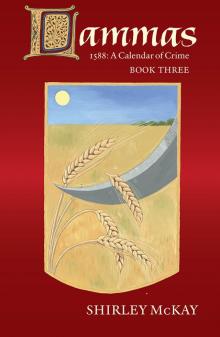 Lammas
Lammas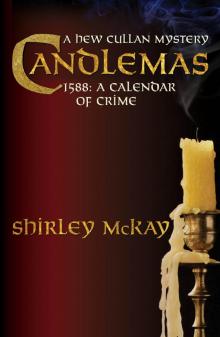 Candlemas
Candlemas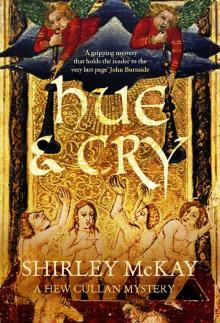 Hue and Cry
Hue and Cry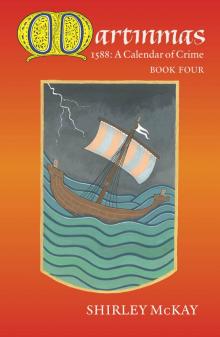 Martinmas
Martinmas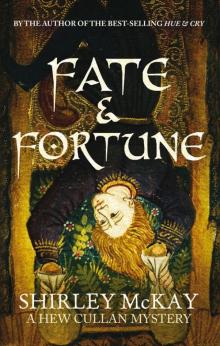 Fate and Fortune
Fate and Fortune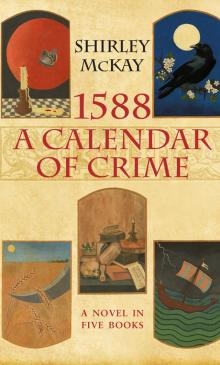 1588 A Calendar of Crime
1588 A Calendar of Crime Time and Tide
Time and Tide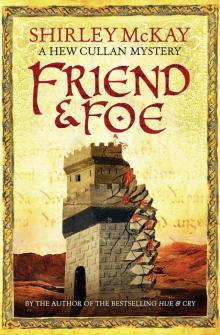 Friend & Foe
Friend & Foe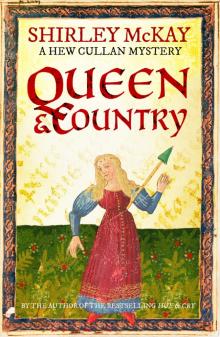 Queen & Country
Queen & Country